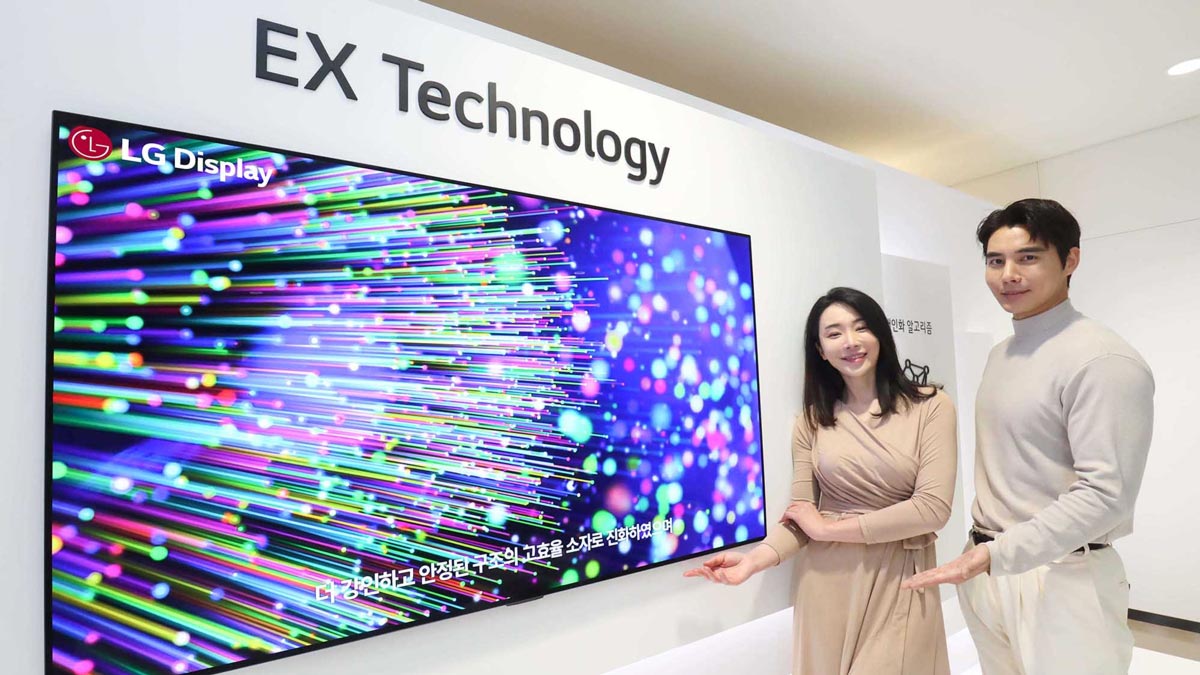LG OLED EX Displays Are Faster, Brighter And Thinner
The Deuterium Enriched Displays are also 30% brighter with 30% Thinner Bezels, says LG.
Get Tom's Hardware's best news and in-depth reviews, straight to your inbox.
You are now subscribed
Your newsletter sign-up was successful
LG Display has revealed some significant improvements to its OLED screen technologies in the run-up to CES 2022. Its latest OLED screen technology is dubbed OLED EX, and it will feature in all new OLED TVs starting in Q2. Key attractions of OLED EX are its "extremely fast" response times and delivery of imagery that is up to 30% brighter in panels with 30% thinner bezels (based on a 65-inch reference model).
With the worthy advances outlined by LG, and the confidence it is showing by adapting its full OLED TV roster, we hope it will proliferate the new OLED EX technology throughout its product stack. That would include monitors, laptop and tablet screens, smartphones and wearable displays. LG's initial PR salvo doesn't quantify the headlining "extremely fast" response times, but it must stir some feelings of desire among PC and VR gaming aficionados.
Deuterium makes the difference
LG has provided some interesting background on the development of OLED EX, a marketing abbreviation of OLED Evolution eXperience. One of the significant changes under the screen surface is the implementation of deuterium compounds. The company refined the process of efficiently extracting deuterium from water, stabilizing it, and applying it to organic light-emitting devices. Naturally, hydrogen isotope deuterium is rare, so LG's extraction process is important to product affordability. The value of deuterium in the OLED display-making process is that it provides the big max brightness boost noted in the intro, and is said to also be more power-efficient.

OLED technology displays are highly regarded due to their inherent per-pixel "true black" reproduction, which facilitates lush contrast. However, they are less competitive in the peak brightness stakes, especially against newer LED tech using quantum dots. Another problem often reported regards the longevity of OLED screens, due to static image "burn-in" issues.
Last but not least, regarding the underlying OLED EX technology, LG highlights its new AI/ML "personalized algorithm," which is provided by the built-in monitor controller. This sounds like intelligent and adaptive image processing based upon content from LG's description. We expect it to be akin to how smartphones use scene detection for "enhancing" photos of various subjects like food, people, landscapes, and parties.
LG's OLED business is doing very nicely, comments a senior display exec. Despite global TV sales being down 12% in 2021, OLED sales grew a very impressive 70%, noted Dr. Oh Chang-ho, EVP & Head of the TV Business Unit. Overall, good take-up and success in the TV market should mean that this OLED EX tech gets implemented in smaller displays like monitors and VR HMD screens sooner rather than later.
Get Tom's Hardware's best news and in-depth reviews, straight to your inbox.

Mark Tyson is a news editor at Tom's Hardware. He enjoys covering the full breadth of PC tech; from business and semiconductor design to products approaching the edge of reason.
-
Alvar "Miles" Udell The day they back OLED panels with a 10 year / 20,000 hour warranty against burn in is the day I consider buying an OLED TV.Reply -
Endymio The article author did a rather slipshod hob of rewriting a company press release. Deuterized compounds in OLEDs do not improve power efficiency, nor do they directly "boost brightness". They provide for a slower breakdown of blue-emitting sources and thus a longer overall lifespan. LG might choose to take advantage of this by boosting output to a point that a protium-compound OLED would degrade too quickly to be practical, but that's a rather different statement.Reply -
Giroro "Personalized AI" sounds like a new advertising algorithm for the filthy Ads that LG builds into their TVs.Reply
I don't want a TV with ads built into it, especially when it's a ridiculously expensive high-end TV.
I'm getting really tired of every single thing in my life trying to squeeze an "infinite amount of money forever" out of me. It comes across as hungry, desperate, and frankly disrespectful. It's like the homeless guy who knocks on your window in a Walmart parking lot, except you paid LG a couple thousand dollars to have him hang out in your living room until he dies.